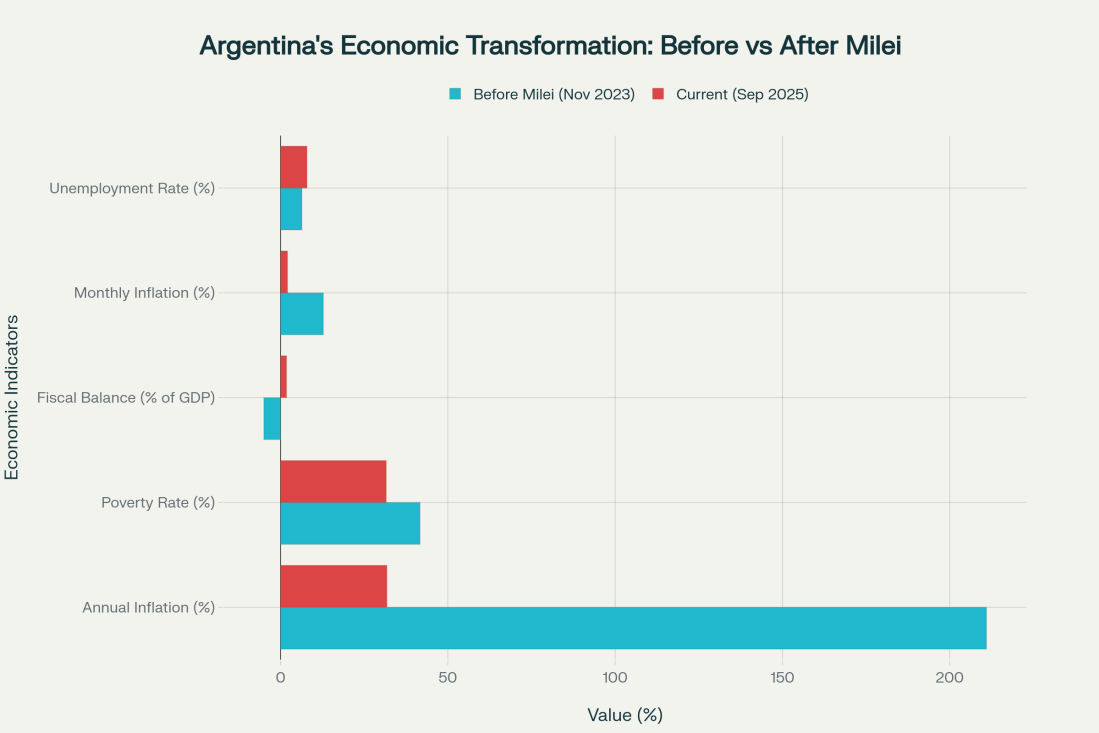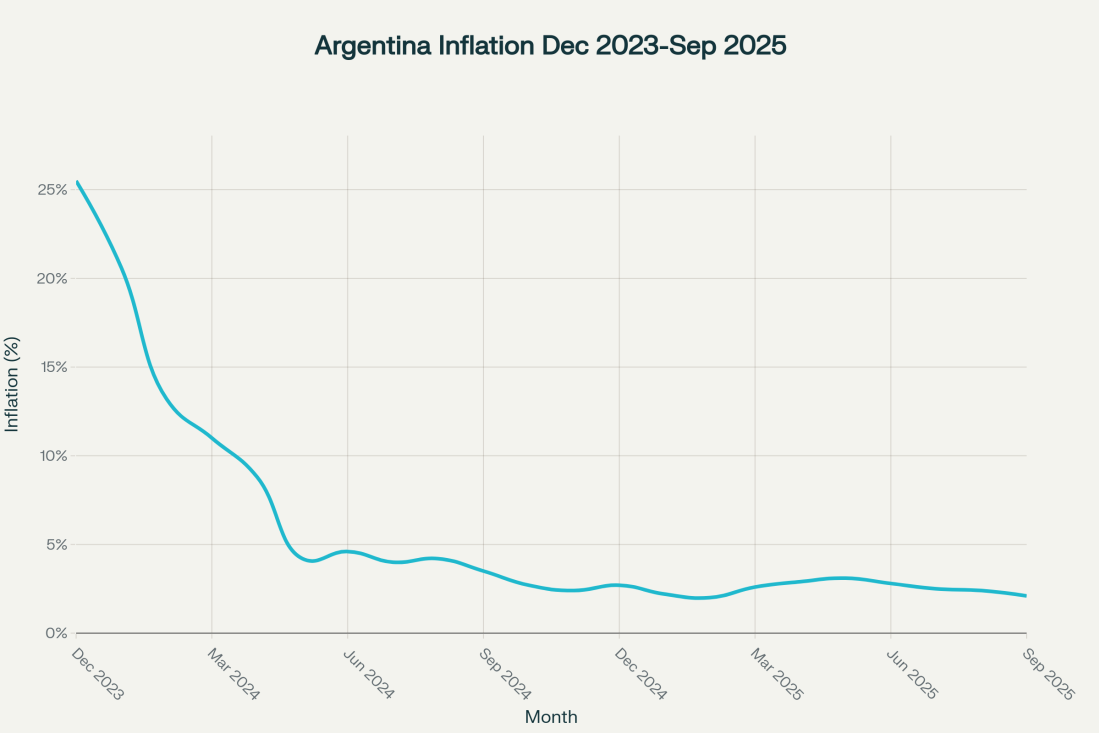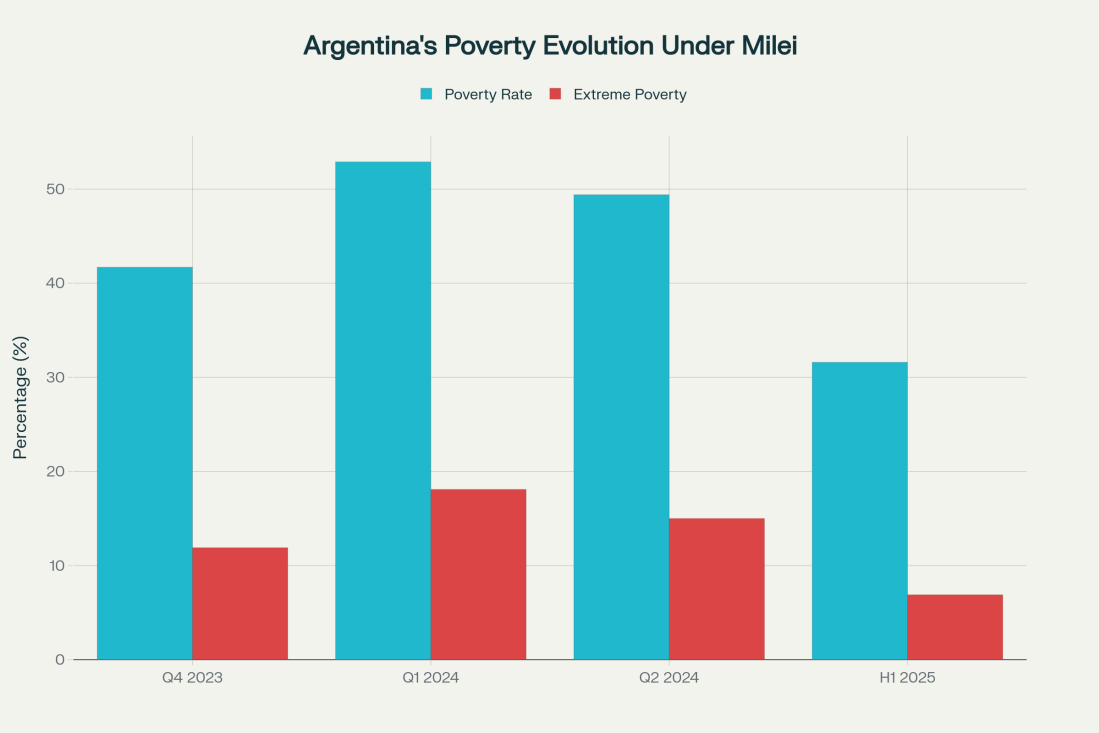China Spring Festival travel rush: 362 mln trips recorded on final holiday day
Chinese travellers made an estimated 362.58 million cross-regional passenger trips on Monday, the final day of the Spring Festival holiday, according ...
When Javier Milei assumed Argentina's presidency on 10 December 2023, the self-proclaimed "anarcho-capitalist" inherited one of the world's most troubled economies.
Nearly two years into his tenure, Milei's radical free-market reforms have delivered dramatic results whilst sparking intense debate about their sustainability and social cost.
The Crisis That Brought Milei to Power
Argentina's economic collapse created the perfect conditions for an outsider candidate. With triple-digit inflation, widespread poverty, and chronic government overspending, traditional politicians had lost credibility.
Milei, a flamboyant economist and television pundit with minimal political experience, capitalised on public anger by wielding a chainsaw at campaign rallies—symbolising his promise to slash through bloated bureaucracy.
He won the November 2023 presidential runoff with 56 percent of the vote, defeating economy minister Sergio Massa by more than 11 percentage points.
His victory marked an unprecedented rupture in Argentine politics. Never before had a complete outsider with no ties to established parties won the presidency.
His libertarian platform promised to dollarise the economy, close the Central Bank, and drastically reduce the state's role—proposals considered extreme even by Argentina's volatile political standards.
The Economic Reform Strategy
Within days of taking office, Milei implemented aggressive "shock therapy" measures. The peso was devalued from 400 to 800 per dollar—a drop exceeding 50 percent—to align the official rate more closely with black market values.
The government slashed public spending with unprecedented severity, eliminating half of the federal ministries and reducing them from 18 to nine.
More than 5,000 public sector employees had their contracts terminated, whilst public works projects were abandoned and subsidies for energy, transport, and utilities eliminated.
These drastic measures achieved a remarkable milestone: Argentina recorded its first budget surplus in over a decade by early 2024. The primary fiscal balance shifted from a deficit of 5 percent of GDP to a surplus, maintained for nine consecutive months.
In April 2025, currency controls were lifted, companies gained ability to transfer profits abroad more easily, and the complex system of mixed exchange rates was replaced with a single unified rate.
Argentina also secured significant international support, obtaining new financing deals worth over USD 23 billion, including a $12 billion immediate release from the IMF.
In January 2025, Moody's upgraded Argentina's sovereign credit rating from 'Ca' to 'Caa3' with a positive outlook.
Economic Outcomes: Progress and Pain

The reforms have delivered measurable macroeconomic improvements alongside substantial social costs. Monthly inflation plummeted from 25.5 percent in December 2023 to 2.1 percent by September 2025—the lowest level since November 2021. Annual inflation fell to 31.8 percent by September 2025, down from nearly 300 percent at its April 2024 peak.

After initially spiking to 52.9 percent in early 2024 following the currency devaluation, poverty rates declined sharply.
By the first half of 2025, urban poverty fell to 31.6 percent—a seven-year low. Extreme poverty dropped to 6.9 percent from 18.1 percent a year earlier.
Following a 3.5 percent contraction in 2024, Argentina's economy rebounded strongly with GDP growth reaching 5.8 percent in the first half of 2025.

However, these achievements came at significant social cost. Between November 2023 and March 2025, private sector jobs fell by 115,000 whilst state employment was reduced by 50,000. Unemployment rose from 6.4 to 7.9 percent—the highest rate since 2021. Purchasing power declined as wages rose 9.6 percent between January and April 2025 whilst inflation reached 11.6 percent over the same period.
Why Argentines Support Milei
Despite the harsh adjustment, Milei maintained substantial public support through much of his presidency.
His outsider status and confrontational rhetoric against the "political caste" resonated with citizens exhausted by traditional politicians.
Argentines consistently identified hyperinflation as their gravest concern, and Milei's success in reducing monthly inflation from 25 percent to around 2 percent addressed voters' most pressing anxiety.
After decades of failed economic policies under various governments, many Argentines proved willing to endure short-term hardship for potential long-term stability. Despite radical campaign rhetoric, Milei demonstrated unexpected political flexibility, successfully negotiating with opposition governors to pass his omnibus reform bill despite his party holding just 39 of 257 seats in the Chamber of Deputies.
By mid-2024, Milei ranked as the third most popular president in Latin America with 48 percent approval. His ratings remained near 50 percent through December 2024, demonstrating remarkable resilience given the economic pain imposed.
Recent Political Developments
Milei's popularity declined heading into the October 2025 midterm elections, with approval ratings falling to 39.9 percent—his lowest level since taking office. Corruption allegations involving his inner circle, including his sister Karina Milei who serves as presidential secretary, damaged his anti-establishment credentials.
However, Milei achieved a decisive victory in the 27 October 2025 midterm elections, defying pre-election polling. His La Libertad Avanza party secured approximately 41.5 percent of the vote nationally, expanding from 37 to 64 seats in the lower house and adding 14 Senate seats to reach 20 senators.
The result provided crucial legislative strength to defend presidential vetoes and advance his reform agenda.
Argentina's experience under Milei represents one of the most radical economic transformations attempted by any democracy in recent decades.
The reforms have successfully reduced inflation, restored fiscal discipline, and reignited economic growth, whilst imposing significant hardship on working families through job losses and reduced purchasing power.
Whether this experiment in libertarian governance proves sustainable—or becomes another chapter in Argentina's long history of failed reforms—will likely be determined by the coming years as the country navigates the tension between macroeconomic stabilisation and social cohesion.
Pakistan said it carried out cross-border strikes on militant targets inside Afghanistan after blaming a series of recent suicide bombings, including attacks during the holy month of Ramadan, on fighters it said were operating from Afghan territory.
Italy said a fond farewell to the Winter Olympics on Sunday with an open-air ceremony in the ancient Verona Arena that celebrated art and sporting achievement at a Games lauded as a model for how to stage such events.
The United States and Iran will hold a new round of nuclear negotiations in Geneva on Thursday as part of renewed diplomatic efforts to reach a potential agreement, Oman’s Foreign Minister Badr Albusaidi announced on Sunday.
Islamic State claimed two attacks on Syrian army personnel on Saturday (22 February), saying they marked the start of a new phase of operations against the country’s leadership under President Ahmed al-Sharaa.
Further Iran-U.S. nuclear talks are scheduled in Geneva on Thursday (26 February) as diplomacy resumes over Tehran’s nuclear programme following earlier mediation efforts. But will the talks move Iran-U.S. negotiations closer to a deal, and what should be expected from the meeting?
Chinese travellers made an estimated 362.58 million cross-regional passenger trips on Monday, the final day of the Spring Festival holiday, according to official data.
Thousands of people gathered across Europe and beyond over the weekend in solidarity with Ukraine, as the war with Russia entered its fifth year.
A powerful winter storm has brought large parts of the U.S. Northeast to a standstill, dumping more than a foot of snow across several states and severely disrupting transport and daily life.
The United Nations mission in Afghanistan said on Monday it had received “credible reports” that at least 13 civilians were killed and seven others injured in overnight Pakistani airstrikes inside Afghanistan.
The former British ambassador to the U.S. Peter Mandelson has been arrested by police in London on suspicion of misconduct in public office.
You can download the AnewZ application from Play Store and the App Store.

What is your opinion on this topic?
Leave the first comment